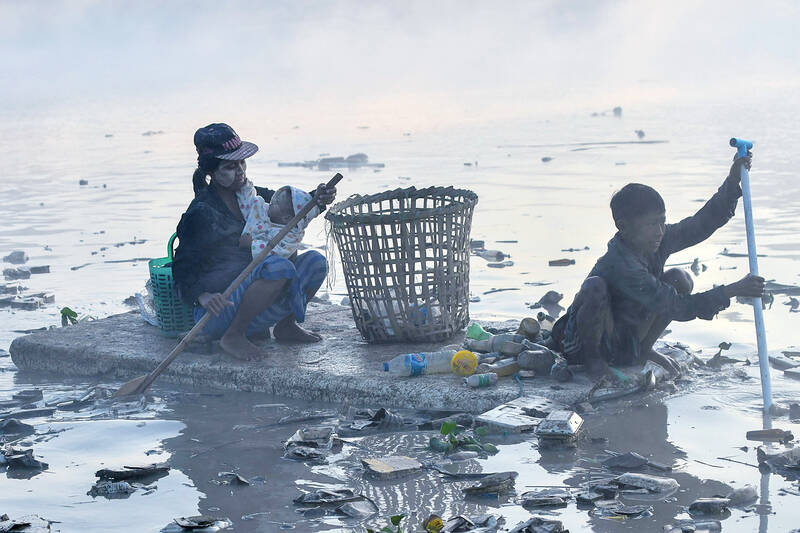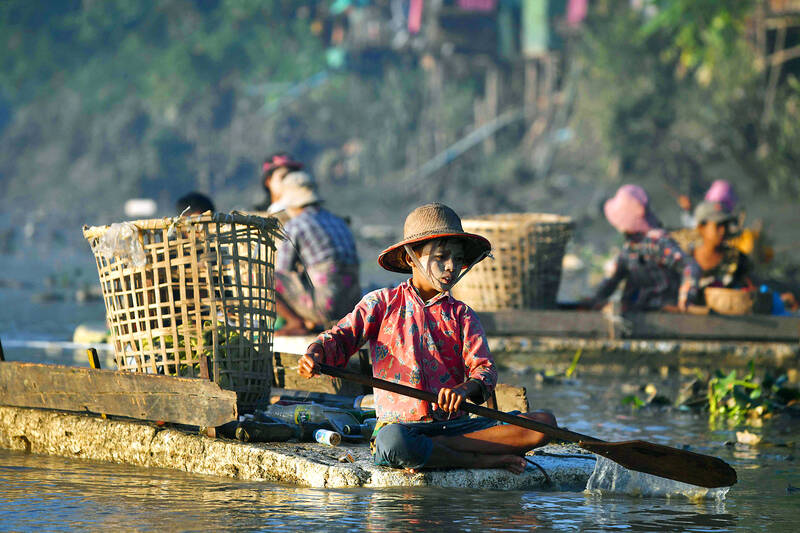Ma Yu launched her makeshift polystyrene boat into a Yangon creek for another day of trawling the filthy waters for plastic and tin cans with her team of “river cleaners.”
About 10 others join her in the dawn light, driven to work the fetid gray-brown murk of Pazundaung Creek by the economic crisis that has gripped Myanmar since the 2021 military coup.
They gather recyclable materials to sell to traders, their only source of income since losing their jobs after the putsch that upended the economy and sparked widespread unrest.

Photo: AFP
“There was no job for me on the land and I’m responsible for my children and my husband’s healthcare,” the 36-year-old Ma Yu told reporters, her cheeks and forehead daubed with the sandalwood thanakha paste popularly used in Myanmar to ward off the blazing sun.
“So I rented some polystyrene sheets and I went onto the creek with my neighbor. On the first day we managed to collect some plastic and cans to sell. We were happy,” she said.
Myanmar’s economy has been battered by the fallout of the coup, with more than 1 million people losing their jobs, according to the International Labour Organization.

Photo: AFP
Ma Ngal, 41, came to the river after losing her job selling vegetables and fish at a Yangon stall, with her carpenter husband also unable to find regular work.
“I didn’t tell my parents and family members that we are doing this work,” Ma Ngal said. “But they found out, and I had to explain to them that I’m doing this for my family.”
On a good day a picker can find trash worth 30,000 kyat (US$10), but more often the take-home pay is about US$3.
“Before we started working there was lots of plastic, cans and bottles on the creek,” said Kyu Kyu Khine, 39, who used to collect trash from Yangon’s streets.
The pickers try to time their working days with the tides — floating downstream in search of more trash when it ebbs and riding it back upstream at the end of a shift.
However, the tidal surges can be treacherous, said Ma Yu, who was knocked off her boat on one of her early forays onto the water.
“Sometimes I think that if something happens to me, I’m all alone here and I can’t do anything,” she said.
The waters also carry regular reminders of the breakdown of order in Yangon, where residents say crime is surging in the aftermath of the coup.
The pickers regularly see dead bodies floating on the water, Ma Yu said.
“It’s not an easy job but ... the important thing for me is that my children don’t starve,” she said.
Her fellow picker Ma Ngal said there are some lighter moments.
“Some people joke with us when they see us working. They say ‘here come the municipal team, they know how to clean up the river,’” she said.

Kehinde Sanni spends his days smoothing out dents and repainting scratched bumpers in a modest autobody shop in Lagos. He has never left Nigeria, yet he speaks glowingly of Burkina Faso military leader Ibrahim Traore. “Nigeria needs someone like Ibrahim Traore of Burkina Faso. He is doing well for his country,” Sanni said. His admiration is shaped by a steady stream of viral videos, memes and social media posts — many misleading or outright false — portraying Traore as a fearless reformer who defied Western powers and reclaimed his country’s dignity. The Burkinabe strongman swept into power following a coup in September 2022

‘FRAGMENTING’: British politics have for a long time been dominated by the Labor Party and the Tories, but polls suggest that Reform now poses a significant challenge Hard-right upstarts Reform UK snatched a parliamentary seat from British Prime Minister Keir Starmer’s Labor Party yesterday in local elections that dealt a blow to the UK’s two establishment parties. Reform, led by anti-immigrant firebrand Nigel Farage, won the by-election in Runcorn and Helsby in northwest England by just six votes, as it picked up gains in other localities, including one mayoralty. The group’s strong showing continues momentum it built up at last year’s general election and appears to confirm a trend that the UK is entering an era of multi-party politics. “For the movement, for the party it’s a very, very big

ENTERTAINMENT: Rio officials have a history of organizing massive concerts on Copacabana Beach, with Madonna’s show drawing about 1.6 million fans last year Lady Gaga on Saturday night gave a free concert in front of 2 million fans who poured onto Copacabana Beach in Rio de Janeiro for the biggest show of her career. “Tonight, we’re making history... Thank you for making history with me,” Lady Gaga told a screaming crowd. The Mother Monster, as she is known, started the show at about 10:10pm local time with her 2011 song Bloody Mary. Cries of joy rose from the tightly packed fans who sang and danced shoulder-to-shoulder on the vast stretch of sand. Concert organizers said 2.1 million people attended the show. Lady Gaga

SUPPORT: The Australian prime minister promised to back Kyiv against Russia’s invasion, saying: ‘That’s my government’s position. It was yesterday. It still is’ Left-leaning Australian Prime Minister Anthony Albanese yesterday basked in his landslide election win, promising a “disciplined, orderly” government to confront cost-of-living pain and tariff turmoil. People clapped as the 62-year-old and his fiancee, Jodie Haydon, who visited his old inner Sydney haunt, Cafe Italia, surrounded by a crowd of jostling photographers and journalists. Albanese’s Labor Party is on course to win at least 83 seats in the 150-member parliament, partial results showed. Opposition leader Peter Dutton’s conservative Liberal-National coalition had just 38 seats, and other parties 12. Another 17 seats were still in doubt. “We will be a disciplined, orderly